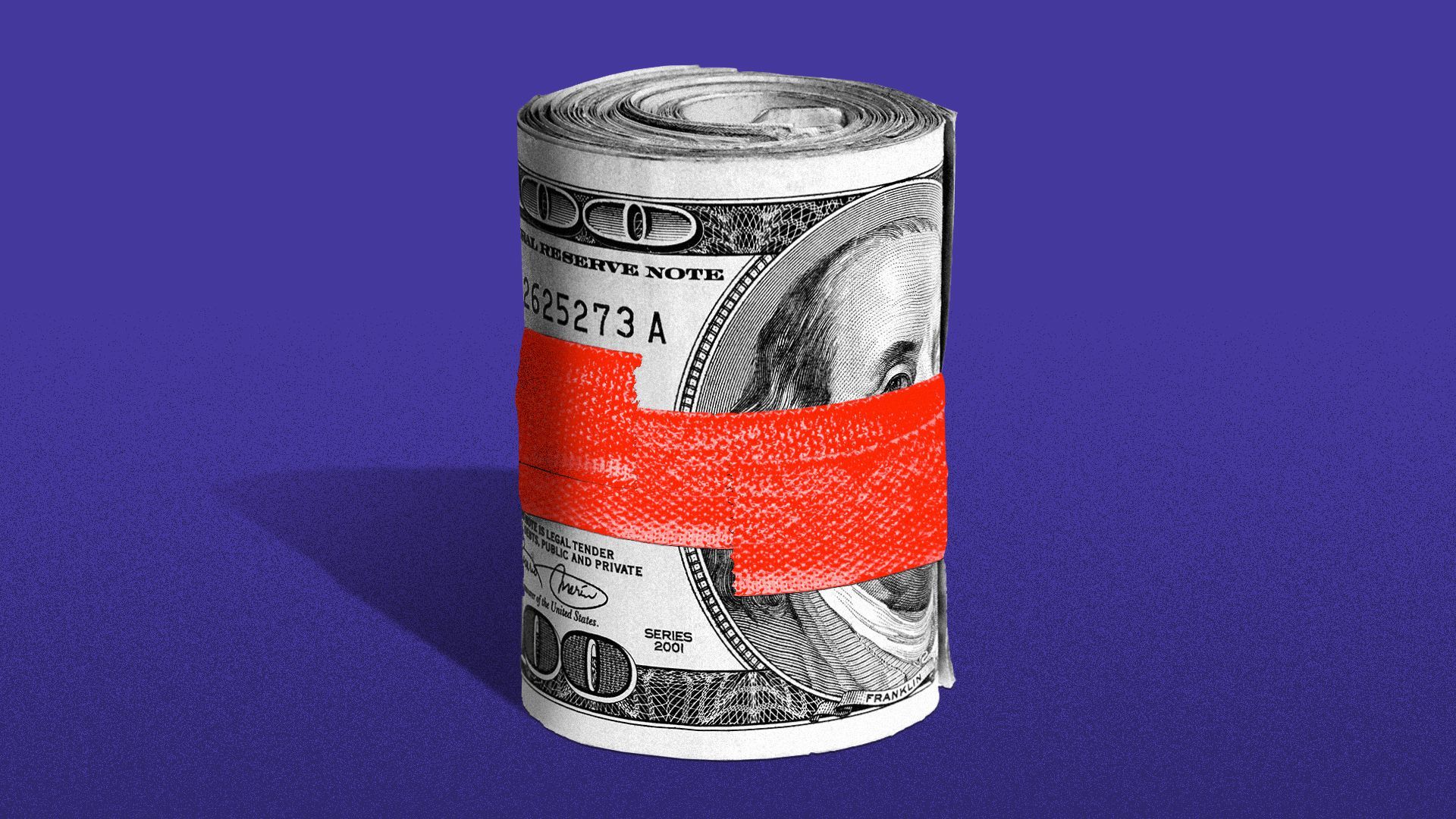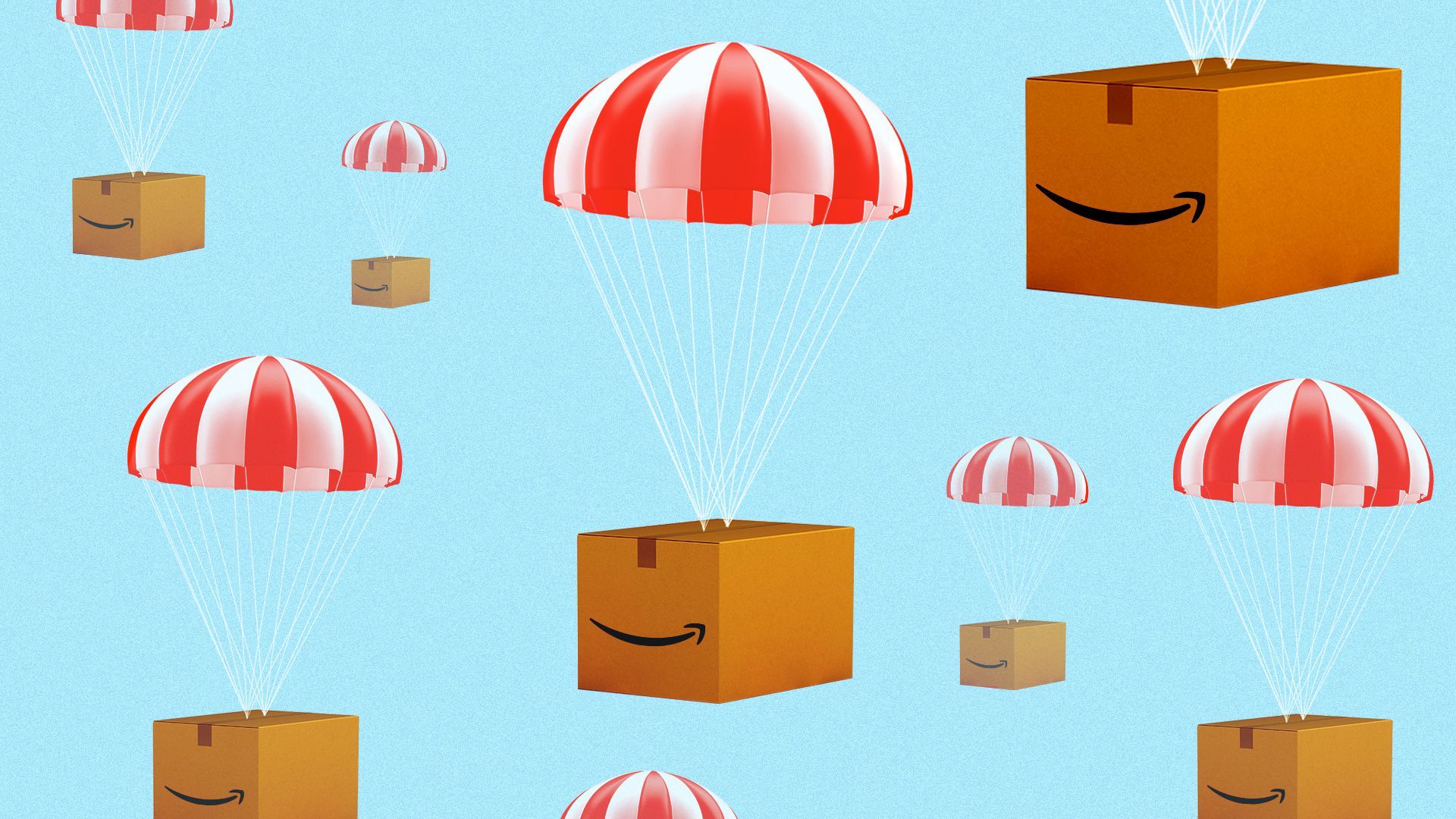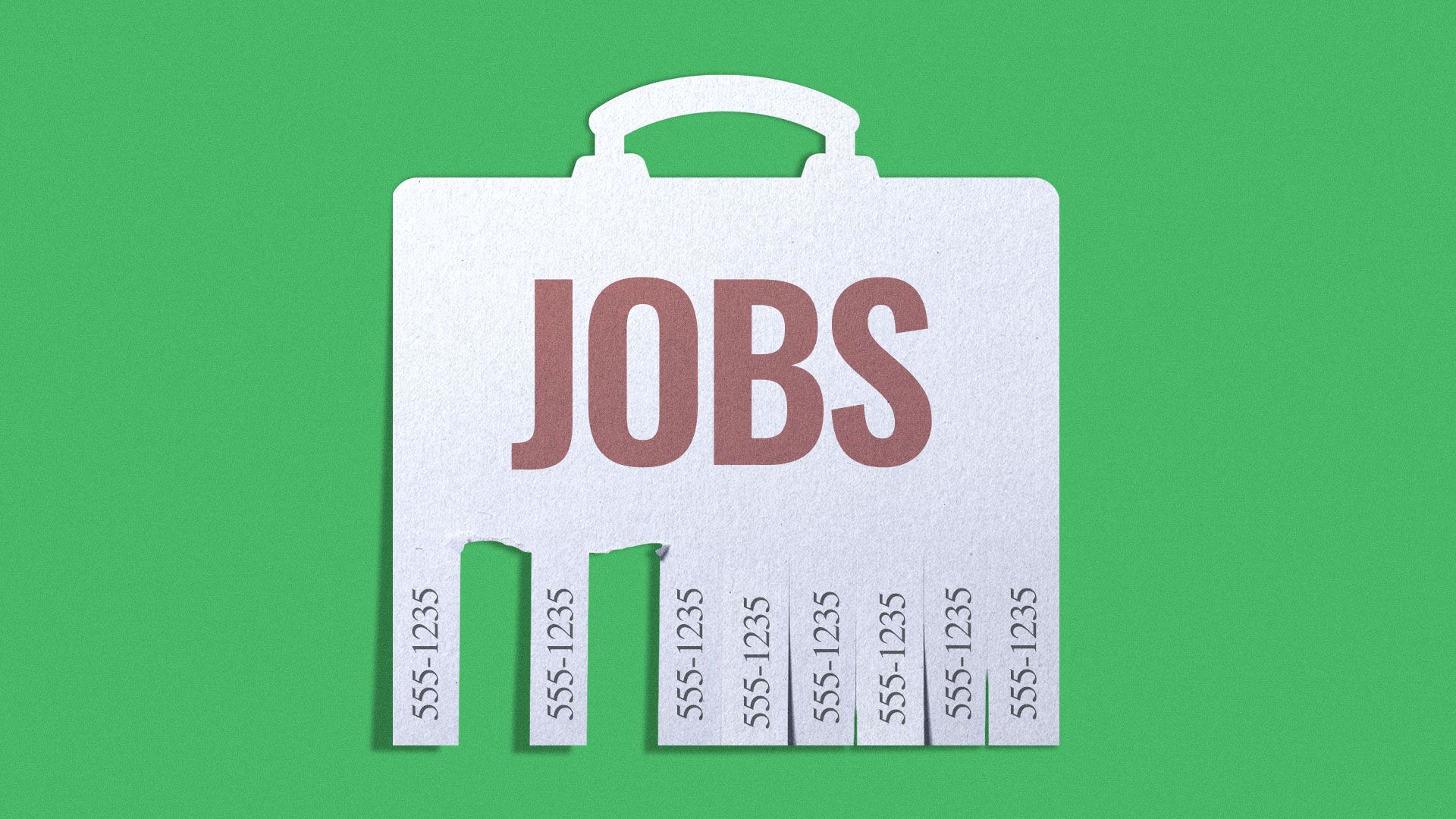| | | | | | | Presented By DEMETER FRAGRANCE LIBRARY® | | | | Axios Capital | | By Felix Salmon ·Dec 03, 2020 | | Situational awareness: Former French President Valéry Giscard d'Estaing has died of COVID-19 at the age of 94. - Finance geeks will remember him as the progenitor of the infamous "Giscard bonds," which were linked to the price of gold and therefore were redeemed at a value of about 100 billion francs, after having been issued for 6.3 billion francs. The bonds appear in "Liar's Poker," by Michael Lewis, and "Bonfire of the Vanities," by Tom Wolfe.
In this week's issue: A look at how much of the financial industry is unregulated; a comparison of Zoom with Slack; Amazon's astonishing hiring spree; a rare fast-food sandwich; and more. All in 1,724 words, a 6-minute read. | | | | | | 1 big thing: The places regulation does not reach |  | | | Illustration: Aïda Amer/Axios | | | | Financial regulation is not exactly simple anywhere in the world. But one country stands out for the sheer amount of complexity and confusion in its regulatory regime — the U.S. Why it matters: Important companies fall through the cracks, largely unregulated, while others contend with a vast array of regulatory bodies, none of which are remotely predictable. Driving the news: Pick a recent headline and it's easy to see how valued — and how obvious — the lack of regulation is in financial markets. - Financial data powerhouse S&P Global is buying rival IHS Markit for $44 billion, even as the London Stock exchange looks like it has received EU approval to buy another huge data provider, Refinitiv, for $27 billion. (The giant in the space, Bloomberg, is worth north of $60 billion.) Such companies are integral to the functioning of financial markets, but, antitrust concerns aside, their operations are largely opaque to regulators.
- S&P Global will also precipitate a massive $100 billion flow out of existing S&P 500 stocks and into Tesla on Dec. 21, when the index giant will finally allow the electric carmaker to join its benchmark index. That's hardly a sign of an efficient market, but regulators have no ability to intervene.
- The Nasdaq stock exchange announced that it wants to delist companies that don't start nominating a diverse slate of directors — something that roughly 75% of those companies don't want to do, according to what Nasdaq itself says is their revealed preference. That power — to possibly reshape the governance of thousands of companies — is being wielded not by any regulator or legislator, but by a privately-owned company. (Admittedly, the SEC does first need to sign off on the plan.)
How it works: Institutions and individuals that control vast wealth — foundations, endowments, billionaires — are almost entirely unregulated. The asset managers who help to invest that wealth are also largely unregulated. - Insurance companies are regulated, but only by a patchwork quilt of state regulators. No federal regulator has oversight or control over the industry.
- The places that the investments are actually held — the so-called custodians — are regulated, which is one reason why investment managers invariably outsource that part of their business.
- The exchanges where the investments are traded tend to avoid close regulation, to the detriment of systemic stability. The "shadow banks" that normally keep those exchanges liquid — except during times of stress — are less regulated still.
- Ratings agencies, proxy advisors, information providers, and other companies providing crucial grease for the wheels of finance — they're largely unregulated too.
What to watch: There's talk that the Biden administration will be much more aggressive about regulating hedge funds than any of its Democratic or Republican predecessors. - Biden's presumptive pick as head of the National Economic Council, however, Brian Deese, would be arriving at the White House via the revolving door from BlackRock. The $7 trillion investment giant has relationships with hundreds of regulators around the world, but no one regulator is charged with looking at it as a single global systemically-important entity.
Of note: JPMorgan's fiduciary arm was recently hit with a $250 million fine by the OCC, one of America's bank regulators. Other major fiduciaries include giant nonbanks like Vanguard, Fidelity, and BlackRock, none of which ever have ever faced a fine remotely as large. The bottom line: The U.S. would benefit greatly from having a single powerful financial regulator operating a principles-based regime that would encompass all financial institutions. Even many of the institutions would welcome such a thing. The problem is that the existing interests are too entrenched for that to ever happen. |     | | | | | | 2. How did Zoom do so much better than Slack? |  | | | Illustration: Sarah Grillo/Axios | | | | Zoom and Slack are very similar companies. One of them is riding high, however, while the other, beset by losses and a sluggish share price, has ended up selling itself to a strategic acquirer. Details: Zoom and Slack are both high-profile and highly successful examples of the new breed of enterprise software. The sales technique is to create a super-popular free version that gets adopted by so many people in a company that eventually the CTO agrees to make it official and buy it. - Because they make software that facilitates remote work, the companies have been helped rather than harmed by the pandemic.
- Both companies also face intense competition. Zoom entered a crowded videoconferencing market when it was born, which has only become more competitive as Google and Microsoft build video capabilities into their own workplace suites. Slack faced less competition in early days but was eventually overtaken by Microsoft's Teams product.
The two companies went public in the second quarter of 2019. They had roughly equal revenues that quarter ($122 million for Zoom, $135 million for Slack), but while Zoom managed to eke out a tiny profit of $200,000, Slack lost more than $30 million. - Since then, Zoom has made $428 million in profits, while Slack has racked up $753 million in losses.
The bottom line: One chart tells the whole story. The $25 billion market cap for Slack incorporates the takeover premium being paid by Salesforce, which would almost certainly love to own Zoom as well. Right now, however, Zoom is well out of Salesforce's league.  Data: FactSet; Chart: Axios Visuals My question: What is the single biggest difference between Zoom and Slack that would explain such wildly divergent outcomes? Send me your ideas, and I'll feature the best ones next week. |     | | | | | | 3. Amazon's second great land-grab |  | | | Illustration: Aïda Amer/Axios | | | | Amazon is in the midst of a hiring spree unprecedented in American corporate history. It's a show of force that, if history is any guide, will be extraordinarily difficult to compete with. By the numbers: Amazon has been doing extremely well during the coronavirus pandemic. In the six months from April through September this year it made a profit of $11.6 billion. That's up from $4.8 billion in the same period of 2019, and a mere $450 million in those six months of 2017. - What's astonishing about those results is that they come during a period of greatly increased costs. Amazon isn't just hiring aggressively; it also has to keep all those new hires safe in the face of a pandemic, while also staying true to its 2019 promise that it would deliver almost everything to Prime members in just one day.
Driving the news: Amazon has increased its workforce by well over 400,000 people this year alone, bringing total headcount to more than 1.2 million. On top of that number, NYT reports that some 600,000 temporary workers and delivery drivers are now working for Amazon. - No company has ever expanded this fast — and the fact that Amazon is adding so aggressively to its full-time workforce shows that the retailer sees this growth as permanent, rather than being a temporary artifact of the pandemic.
- The message is clear: Amazon is intent on taking advantage of the pandemic to increase its competitive advantage over all other retailers, to build an all but insurmountable gap.
Flashback: Amazon did something similar following the dot-com crash of 2000. While its competitors were struggling to stay alive, Amazon spent three years building developer tools and APIs that would give quick and easy access to Amazon's computation, database, and storage capabilities. - At first, the project was designed just for internal use, but eventually it was expanded to be available to anyone.
- By the time Amazon launched its first cloud-computing product, EC2, in 2006, it was effectively six years ahead of any competition — and it took another few years for other companies to even try to compete in what is now known as "the cloud".
- Amazon's cloud business, AWS, made $3.5 billion of net profit on its own in the third quarter of 2020. That's 56% of the company's consolidated net income.
The bottom line: Amazon is the one mega-cap company that has real capacity to absorb and reinvest the massive profits that it's throwing off. It has never paid a dividend, and it hasn't bought back any of its own stock since 2012. Instead, it's building a seemingly invincible real-world army. |     | | | | | | A message from DEMETER FRAGRANCE LIBRARY® | | The hand sanitizers that are perfect for the holidays | | |  | | | | Demeter has launched a new line of holiday hand sanitizers, helping you stay safe while remaining festive. Here's how: with a gentle mix of 80% ethyl alcohol and top shelf fragrance oils – you can choose from scents like Christmas tree and gingerbread. Stay safe and smell great. | | | | | | 4. The McRib returns |  Data: FactSet, Axios research; Chart: Danielle Alberti/Axios The McRib from McDonald's is a rare beast indeed. U.S. fast-food chains tend to avoid pork, outside of breakfast items, and the McRib hasn't been available nationwide since 2012. Why it matters: A popular theory holds that the McRib only appears when hog prices hit a low point. The McRib's unique aspects and impermanence, many of us believe, make it seem a likely candidate for being a sort of arbitrage strategy .... In this equation, the undervalued good in question is hog meat. Between the lines: The McRib seems to have been consistently introduced at low points in the price of pork — until this year, when the low point came in late June. - Note how long it's been, however, since the last McRib rollout. Perhaps it was precisely those low June prices that finally tempted McDonald's back into the pork business.
- Given the sophistication of commodity markets, it would have been easy for the company to buy pork in June for delivery in December. In which case the company would be entirely agnostic as to the market price today.
|     | | | | | | 5. Coming up: The November jobs report |  | | | Illustration: Eniola Odetunde/Axios | | | | The November jobs report is out tomorrow at 8:30am ET, writes Axios' Courtenay Brown. - The economy is expected to have added roughly 500,000 jobs last month. The unemployment rate probably fell 0.1 percentage point to 6.8%.
Why it matters: If that number is roughly correct, it would mean jobs growth slowing for the fifth straight month since the economy added 4.8 million jobs in June. - It would also mean the labor market is continuing to recover — even with the virus outbreak worse than it's ever been.
Of note: Economists point out that some high-frequency indicators suggest a weaker (or even negative) jobs print. But those indicators have been far from perfect proxies for payrolls since the pandemic hit. |     | | | | | | Bonus: The terrible state of the labor market |  Data: BLS via FRED; Chart: Andrew Witherspoon/Axios This is the chart I ran yesterday, in a story about the daunting task facing President-elect Joe Biden's economic team. - By the numbers: Employment is much worse than during the Great Recession. The total number of jobs in America is still more than 10 million below its peak, even after a significant rebound.
What they're saying: We're facing "an American tragedy," said Treasury Secretary nominee Janet Yellen on Tuesday. "It is essential we move with urgency. Inaction will produce a self-reinforcing downturn, causing yet more devastation." |     | | | | | | 6. Building of the week: The Shay Hexagon House |  | | | Photo: Carol M. Highsmith/Buyenlarge/Getty Images | | | | The Hexagon House was built in 1892 by Ephraim Shay, in Harbor Springs, Michigan. - Shay, who invented an eponymous logging locomotive, built the house near a machine works as his private residence.
- The house is constructed entirely of stamped steel. (The art on the walls is held there by magnets.)
- Having entered the National Register of Historic Places in 1972, the house is now owned and operated as a museum by the Harbor Springs Historical Society.
|     | | | | | | A message from DEMETER FRAGRANCE LIBRARY® | | The hand sanitizers that are perfect for the holidays | | |  | | | | Demeter has launched a new line of holiday hand sanitizers, helping you stay safe while remaining festive. Here's how: with a gentle mix of 80% ethyl alcohol and top shelf fragrance oils – you can choose from scents like Christmas tree and gingerbread. Stay safe and smell great. | | | | Thanks for reading! As ever, the sign-up link is here. | | | | Axios thanks our partners for supporting our newsletters.
Sponsorship has no influence on editorial content. Axios, 3100 Clarendon Blvd, Suite 1300, Arlington VA 22201 | | | You received this email because you signed up for newsletters from Axios.
Change your preferences or unsubscribe here. | | | Was this email forwarded to you?
Sign up now to get Axios in your inbox. | | | | Follow Axios on social media:    | | | | | |
No comments:
Post a Comment